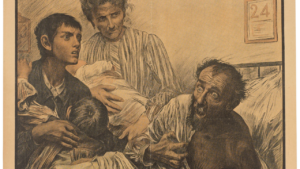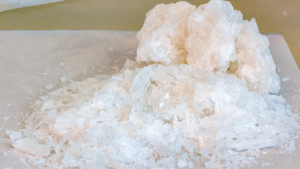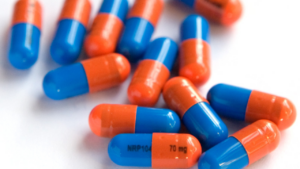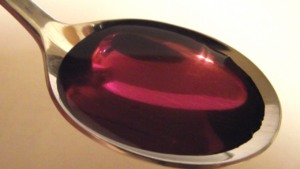When you read the title of this blog, maybe you were surprised to find out that drinking mouthwash is actually something that happens. Maybe you were less surprised and know someone who does drink mouthwash—or maybe that person is you. No matter how you reacted when you saw this title, it seems like we could all agree that mouthwash is a pretty ordinary thing! Most people have mouthwash in their households; I know I do. Everyone has lots of stuff shoved into the cabinets beneath their bathroom sinks and even if you don’t regularly use it, a semi-dusty bottle of light blue cool mint-flavored Listerine® is probably sitting under there somewhere. Of course, mouthwash alone isn’t a bad thing. In fact, it can be a useful thing to have around. After all, it is an easy fix for things like bad breath or keeping plaque and gingivitis under control. Because mouthwash is so common and easily accessible (just take a trip to your local supermarket and you can find a whole aisle full of mouthwash brands with assorted flavors and colors), it can also be a cheap and easy way for individuals struggling with an alcohol dependency or addiction to continue a habit of consuming alcohol. Alcohol is a key ingredient in mouthwash. We might recall being younger and exaggerating the number of times we spit in the sink after using mouthwash to avoid getting drunk or giggling with friends if we accidentally swallowed a small sip of the minty liquid. In really tiny amounts, mouthwash isn’t harmful. However, the reality is that some people do drink mouthwash as a substitute for alcohol. It’s very low cost and extremely accessible in many places, including places where alcohol is scarce. There are also some grave health consequences of continued mouthwash ingestion. Together we’ll take a look at why people drink mouthwash, the side effects of drinking mouthwash, and what solutions and treatment are available to you or your loved ones.
Why Do People Drink Mouthwash?
At first, it might sound kind of strange if you aren’t familiar with the idea of people drinking mouthwash as if it were just another beverage. However, there are a variety of reasons why someone could turn to a regular habit of drinking mouthwash. For some people who are recovering alcoholics or have just left a rehab program for alcohol dependence and addiction, mouthwash is an easily accessible and generally non-suspicious purchase or household item. Recovering alcoholics who have relapsed may turn to mouthwash as a source for alcohol. Drinking mouthwash is a way to hide continued alcohol use at home. The use of mouthwash can be easy to hide and it doesn’t leave the same recognizable smell of alcohol around a person. Purchasing mouthwash is also a common occurrence and generally won’t raise the suspicions of friends or family members. Drinking mouthwash is also an easy way for people who have limited access to alcohol to get a buzz. For example, people who are serving time in jail or are in the military generally do not have any available means of accessing alcohol. However, mouthwash is readily available and is often provided as part of hygiene kits for those in prison or even in mini personal care kits that are supplied by hotels or motels for travelers. Care packages and provided equipment for military personnel can also include mouthwash alongside usual items like toothpaste or toothbrushes. To sum up, the main idea here is that mouthwash, as many of us know, is extraordinarily easy to find and get a hold of. Having mouthwash in your house isn’t seen as a suspicious substance at all. Instead, it’s just an ordinary object that you might expect to find in many people’s bathrooms. There are also no age restrictions when it comes to purchasing mouthwash. While the U.S. requires people to be at least 21 years old to purchase alcohol, or 18 to buy cough syrup, no such age restriction exists for mouthwash. It is true that mouthwash misuse is not quite as widespread or notable as alcohol or cough syrup, but the lack of an age requirement only boosts the accessibility of mouthwash. [inline_cta_two]
How Much Alcohol Does Mouthwash Even Have?
Now we’ve learned about why mouthwash is an easy choice for those looking for a quick alcohol fix, but what is the alcohol content of mouthwash? Does drinking mouthwash produce the same kinds of effects as other alcoholic beverages like wine, beer, or hard liquor? Mouthwash often contains a very specific kind of alcohol known as ethyl alcohol. This is a type of alcohol that is not intended for human ingestion. Ingesting ethyl alcohol can be poisonous to the body and result in some very negative health consequences. Other common household items that contain ethyl alcohol include hand sanitizer, hair spray, perfume, and aftershave. Even though ethyl alcohol still has the word “alcohol” in its name, it’s not safe to consume. There are many different types of alcohol, although we might associate alcohol with liquor, drunkenness, and hangovers. According to RDH, a magazine for dental hygiene professionals, “the alcohol content of many of these products may exceed conventional alcoholic beverages by large margins.” The article offers several examples of a variety of mouthwashes. Notable brand Listerine is approximately 26.9% alcohol, with many of the mint variety mouthwashes coming in around 22%. Cepacol® is a brand that has a lower alcohol content, coming in at 14%, but this percentage is still very high compared to drinks like wine or beer. Common beers often contain around 3% to 7% alcohol while wine is usually comprised of somewhere around 12% alcohol. Of course, some beers and wines will have less or more than these numbers, but on the whole, mouthwash’s alcohol content still greatly surpasses that of conventional alcoholic beverages. Besides taking in greater quantities of alcohol, this type of alcohol can take a great toll on your health. If you ingest too much mouthwash, you can be at risk of poisoning yourself.
Poisoning Symptoms From Mouthwash
- Stomach pain
- Nausea
- Dizziness
- Drowsiness
- Diarrhea
- Headache
- Low blood pressure/low heart rate
- Slurred speech
- Excessive sweating
- Unusually loud speech
- Difficulty maintaining balance
- Swaying, inability to sit up properly, stumbling
If you or someone near you is experiencing these symptoms and inappropriate mouthwash use is involved, call 911 or Poison Control (800-222-1222) immediately. The sooner help can be administered, the lower the risk is of experiencing more dangerous complications. [middle-callout]
How Do I Kick A Habit Of Drinking Mouthwash?
If you have an addiction to drinking mouthwash as an easy way to get drunk or access some kind of alcohol, you might feel ashamed of your inability to control your habits or be unsure of what to do. In order to truly overcome any kind of addiction, it is always most effective to seek professional treatment for addiction. We know that addiction can be unexpected and maybe you never thought it would happen to you. That’s OK. Once you realize you have a problem you want to change, we are here to help you through it. At our peaceful facility in the Sherrodsville, Ohio area, we offer comprehensive and individualized treatment for alcohol addiction. Our therapies are individualized for our clients, and we take pride in our specially designed programs that promote long-term recovery beyond the standard 30-day recovery program. Get the finest individualized addiction treatment with a program that understands the challenges of addiction. At The Bluffs, we look forward to providing a comfortable environment for all of our patients where they are properly supported as we work together to overcome alcohol addiction. Rehab for alcoholic is available here for you to turn your life around. Call 888-481-7821 today to get started. [inline_cta_four]
Frequently Asked Questions
Is it safe to swallow Listerine? You should avoid swallowing Listerine or any kind of mouthwash. Mouthwash contains ingredients such as ethyl alcohol that can be highly toxic, depending on the amount ingested. Overall, it is best to always avoid swallowing mouthwash; spit it out into the sink instead. What happens if I swallow mouthwash? If you only swallow a very small amount of mouthwash, you probably won’t experience any side effects. The side effects of mouthwash occur when you swallow larger amounts and at a greater frequency. Too much ingested mouthwash can be poisonous. Is mouthwash with alcohol bad for you? All mouthwash has alcohol because it is created to help combat things like bad breath, which is caused by microbes in your mouth. The alcohol in mouthwash helps kill harmful bacteria to promote healthier teeth and gums. However, too much of the alcohol in mouthwash can be toxic to humans. This is why you should not drink mouthwash. Instead, use mouthwash as directed on the bottle: gargle and then spit. How dangerous is it to swallow mouthwash? A small amount of mouthwash won’t kill you or really harm you in any way. When you start drinking large amounts of mouthwash as a way of drinking alcohol or getting drunk, you start to run into greater possibilities of harming your health. The alcohol in mouthwash is neither designed nor intended for human consumption. Drinking mouthwash can poison your body and lead to serious physical side effects and a potential for addiction.







